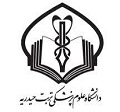(2020) Uncovering psychobehavioral implications of SARS-CoV-2 infection in Iran. Transboundary and Emerging Diseases. ISSN 18651674
Full text not available from this repository.
Abstract
Iran is the country in Western Asia most impacted by the COVID-19 outbreak. A survey was conducted among the general public in Iran aimed at investigating psychobehavioural issues related to the COVID-19 outbreak, namely: 1) barriers to preventive measures against SARS-CoV-2 infection; 2) negative emotions toward SARS-CoV-2 infection; and 3) anxiety levels among the general public in Iran. A cross-sectional, web-based survey using an online questionnaire was carried out between 16 March and 1 April 2020. The six-item version of the State-Trait Anxiety Inventory (STAI-6) was used to assess anxiety levels. A total of 1,789 complete responses were received. Nearly 60 reported having difficulty in wearing a face mask to protect against SARS-CoV-2 infection. The mean and standard deviation (SD) for the total prevention barrier score was 35.8 (SD ± 7.1; range 18 to 68) out of a possible score of 72. Male respondents odds ratio (OR) = 1.25; 95% confidence interval (CI) 1.03 to 1.51 and respondents who perceived their health status as poor/fair (OR = 1.49; 95% CI 1.31 to 1.82) were predictors of high prevention barriers. Negative emotions such as fear (74.6%), followed by depression (43.4%) and stigma (23.0%) associated with SARS-CoV-2 infection were reported. Respondents who perceived their health as poor/fair (OR = 2.19; 95% CI 1.57 to 3.04) reported a higher likelihood of having higher negative emotions. Findings on anxiety level revealed 68.0% (95% CI 65.8 to 70.1) reported moderate to severe anxiety. Respondents who perceived their health as poor/fair (OR = 3.46; 95% CI 12.22 to 5.40) and who were females (OR = 1.91; 95% CI 1.55 to 2.36) were predictors of moderate to severe anxiety. In conclusion, psychobehavioural interventions are needed to facilitate management and control of the COVID-19 outbreak. This article is protected by copyright. All rights reserved.
| Item Type: | Article |
|---|---|
| Keywords: | anxiety; COVID-19; Iran; psychobehavioural; SARS-CoV-2 |
| Journal or Publication Title: | Transboundary and Emerging Diseases |
| Journal Index: | ISI, Pubmed, Scopus |
| Publisher: | Blackwell Publishing Ltd |
| Identification Number: | 10.1111/tbed.13662 |
| ISSN: | 18651674 |
| Depositing User: | دکتر محبوبه عبداللهی |
| URI: | http://eprints.thums.ac.ir/id/eprint/2291 |
Actions (login required)
 |
View Item |



